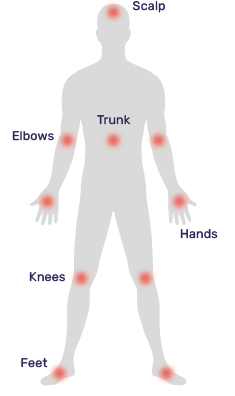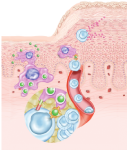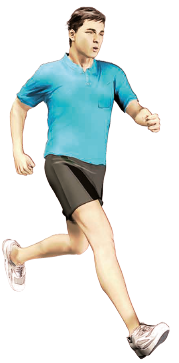WHAT IS PSORIASIS?1,2
Psoriasis is a common chronic inflammatory skin condition that causes areas of thickened, inflamed, red skin, often covered with white scales.
Psoriasis is a common chronic inflammatory skin condition that causes areas of thickened, inflamed, red skin, often covered with white scales.


The disease develops due to a combination of immune, genetic, and environmental factors. In psoriasis, immune cells enter the skin and cause the epidermis to grow very rapidly and to stop shedding properly, causing skin thickening and the scaly build-up composed of dead skin cells.

Psoriasis is uncommon before the age of 10 years, it occurs primarily in adults. Women and men are equally affected. Psoriasis is not contagious.

Psoriasis can be diagnosed by examining the skin. Occasionally, a skin biopsy or scraping may be taken to rule out other disorders.

Psoriasis is an inflammatory condition so people with psoriasis might feel better eating more inflammation-fighting foods.


Some foods that should be avoided since they can increase inflammation are:

Patients with psoriasis are more likely to have cardiovascular risk factors. Physical activity is well-known for its health benefits and the associated reduction in coronary heart disease risk.

Also, increased physical activity reduces the risk of developing psoriasis.

Subject to doctor recommendation.
References: 1. Feldman SR. Patient education: Psoriasis (Beyond the Basics). [Internet] Up To Date [Last accessed: Aug 24, 2020]. Available at: www.uptodate.com | 2. Gudjonsson JE, Elder JT. Psoriasis. In: Kang S, Amagai M, Bruckner AL, Enk AH, Margolis DJ, McMichael AJ, Orringer JS. eds. Fitzpatrick's Dermatology, 9e. McGraw-Hill; Accessed August 24, 2020. https://accessmedicine.mhmedical.com/content.aspx?bookid=2570§ionid=210417798 | 3. What You Should Know About Psoriasis and Your Diet [Internet] WebMD ast accessed: Aug 24, 2020]. Available at: https://www.webmd.com/skin-problems-and-treatments/psoriasis/psoriasis-avoid-foods | 4. Sharif K, Watad A, Bragazzi NL, Lichtbroun M, Amital H, Shoenfeld Y. Physical activity and autoimmune diseases: Get moving and manage the disease. Autoimmun Rev 2018;17(1):53-72. | 5. Amin M, Lee EB, Bhutani T, Wu JJ. Do Psoriasis Patients Engage In Vigorous Physical Activity? Cutis actions. 2018;101(3):198-200.
Disclaimer: The information reflected is not to be construed as medical advice. The HCP
should always be consulted first
(especially in regard to adopting an exercise
regime).
Disclaimer: The information contained herein is provided for educational purposes only and is not intended to constitute
medical advice or replace discussions with a healthcare provider. All decisions regarding patient care must be made
with a healthcare provider, considering the unique characteristics of the patient.